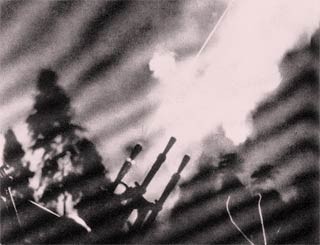(VOVworld) - In late 1972, Vietnam and the US reached a treaty to end the war and restore peace in Vietnam. However, the US broke the agreement and sent B52 bombers to blitz Hanoi and Hai Phong. But, its 12-day and night air strike failed, forcing the administration of President Richard Nixon to negotiate and sign the Paris Accords on January 27, 1973 to withdraw all troops from Vietnam. Let’s learn more about the glorious victory dubbed as “Dien Bien Phu in the air victory”, which defeated the US aggressors in Vietnam’s skies through the memory of colonel Le Dinh Sy, former Deputy Director of the Army History Institute of Vietnam.
 |
During the 12-day air strike, the US Air Force used B52 bombers 663 times and strategic bombers 3,920 times to carpet 100,000 tons of bombs on Hanoi, Hai Phong, and some key positions in northern Vietnam. More than 10,000 tons of bombs were dropped in Hanoi, destroying many streets and villages. Kham Thien street, one of the busiest streets in Hanoi, was heavily bombarded. Approximately 2,000 houses, temples, schools, and health facilities were destroyed, 287 people were killed and 290 were injured. A family of 6 members were buried in the ruins. More than 100 residential places in Hanoi such as Bach Mai hospital, Gia Lam, Yen Vien, and An Duong were bombarded, and more than 1000 people were killed.
Colonel Le Dinh Sy worked at the Army History Institute of Vietnam at that time.
"Vietnamese people and soldiers were worried for Hanoi as we were told that the US’ air force, with the B52 bombers, was very strong. In fact, after the 1st operation from December 18 to 24, we felt secure. We didn’t flinch because we had sufficient weapons and strong determination to encounter the strategic air strike," Sy recalled.
The B-52 air strike on Hanoi and some northern provinces, which was called Operation Linebacker II, aimed to destroy and paralyze the will of Vietnamese people, forcing Vietnam to surrender and accept the conditions set by the US at a convention in Paris. President Nixon believed that the B-52 bombers would turn Vietnam back to the Stone Age. But the raids failed. Nixon wrote in his memoirs that what had haunted him was neither the domestic nor international opposition, but the heavy loss of B-52 bombers. Le Dinh Sy says: "The “Dien Bien Phu in the air” is a victory of the people’s united power. The victory is attributed to close cooperation between the Air Force, the paramilitary anti-aircraft, and all other organizations and forces in Hanoi. The lesson learnt from this operation is that with the people’s unity and consensus under the leadership of the Communist Party of Vietnam, we can defeat any types of weapons and adversary."
In this struggle for independence and justice, Vietnam was not alone. The world, especially socialist countries of the former Soviet Union and China, supported Vietnam spiritually and materially including weapons. International pacifists voiced their opposition against the American imperialists and President Nixon’ carpet bombing operation which killed many civilians.
The western military and diplomatic circles could not explain the US’s failure. Researcher of Military History Le Dinh Sy again: "Many foreign military researchers examined Vietnam’s victory. They knew that the US had the world’s most powerful army, while Vietnam was a backward country. We could not compare ourselves with the US in military aspects, except our united strength. We had our own tactics and strategy. We believed in victory because we had justice and all our people were ready to sacrifice for the nation. We didn’t dare to confront the strongest weapon and the most advanced fighters at that time."
Dien Bien Phu in the air victory proved the wise political leadership and military art of the Communist Party of Vietnam which integrated the regular troops, guerillas, and paramilitary to form three air-defense networks defeating the US Air Force. The victory was a striking evidence of national strength and international support.